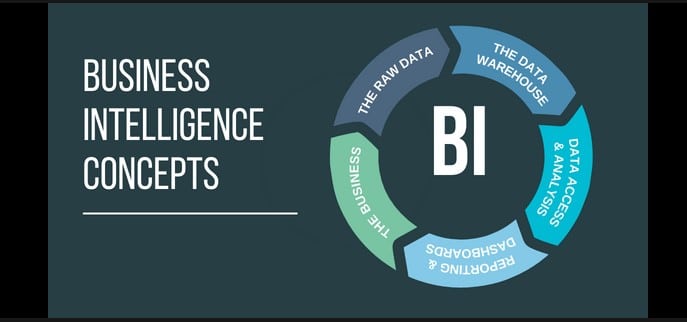If you’re running a business, you’ve probably heard of Business Intelligence or BI, and maybe even wondered, what is Business Intelligence? BI Meaning and Applications? If this sounds like you, you’re in the right place. Business Intelligence is not just a techy term that IT guys throw around. It’s a game-changer in today’s data-driven business world, and it’s essential for you to understand what it means and how it can be applied to your business.
I. Decoding Business Intelligence: The What and Why
1.1. What is Business Intelligence? BI Meaning and Applications
Business Intelligence (BI) is a technology-driven process that involves the collection, integration, analysis, and presentation of business information. The purpose of BI is to support better business decision-making. Essentially, Business Intelligence systems and software applications can provide you with the past, present, and future views of your business operations.
Business Intelligence tools can handle large amounts of unstructured data to help identify, develop, or otherwise create new strategic business opportunities. With BI, you can interpret massive data and understand what’s happening in real-time to support tactical and strategic business decisions.
1.2. Why Does Business Intelligence Matter?
In the current digital age, a business has to deal with a plethora of data. Understanding this data and drawing relevant insights from it can mean the difference between a business that thrives and one that barely survives. That’s where Business Intelligence comes into play.
BI allows businesses to make informed decisions by providing present, historical, and predictive views of business operations. It turns raw data into meaningful information that businesses can use to enhance profitability, improve efficiency, reduce costs, and more.
II. Delving Deeper into Business Intelligence: The How
2.1. The Mechanism Behind Business Intelligence
Business Intelligence involves several steps: data collection, data cleaning, data integration, data analysis, and finally, data visualization. Each of these steps is integral to deriving valuable insights from raw data. But keep in mind that the quality of your BI insights will only be as good as the data you feed into the system.
2.2. The Role of BI Tools
BI tools are software that fetch, analyze, and present data. They come in many forms, including dashboards, data visualization tools, reporting tools, and data mining tools. These tools enable users to transform raw data into legible insights, without requiring deep technical knowledge.
III. The Scope and Application of Business Intelligence
3.1. BI in Sales and Marketing
Imagine being able to predict your customers’ purchasing behavior. That’s the power of BI in sales and marketing. It allows you to understand customer behavior and market trends, enabling you to craft effective sales strategies and marketing campaigns.
3.2. BI in Supply Chain Management
BI provides crucial insights for managing the supply chain more efficiently. It can help identify bottlenecks, monitor supplier performance, optimize routes, and much more. It’s like having a bird’s eye view of your entire operation.
IV. Choosing a BI Solution: What to Look For
4.1. Scalability and Integration
When choosing a BI tool, consider its scalability and integration capabilities. It should be able to grow with your business and integrate smoothly with your existing systems.
4.2. Ease of Use and Training
Another critical aspect to consider is how easy it is to use the tool and how much training is required for your team to get up to speed. After all, a tool is only as good as your ability to use it effectively.
V. The Impact of Business Intelligence on Businesses
5.1. Improved Decision Making
With BI, you’re not just guessing anymore. You make decisions based on data, which reduces risks and improves outcomes.
5.2. Increased Operational Efficiency
BI can highlight inefficiencies in your operations that you might not have even known existed. By identifying these, you can take steps to improve efficiency and productivity.
VI. The Future of Business Intelligence
6.1. The Emergence of AI in Business Intelligence
Artificial Intelligence (AI) and Machine Learning are already making a big splash in the world of BI. With AI, BI tools can deliver even more accurate forecasts and even automate some decision-making processes.
6.2. The Growing Importance of Real-time BI
In the fast-paced digital world, businesses need real-time insights. Real-time BI can provide instant data analysis and reporting, enabling businesses to react promptly to changing circumstances.
FAQs
Q: What is the main purpose of Business Intelligence?
A: The main purpose of Business Intelligence is to help businesses make well-informed decisions based on data-driven insights.
Q: Can small businesses benefit from Business Intelligence?
A: Absolutely! Regardless of size, all businesses generate data and can benefit from the insights derived from that data.
Q: Is Business Intelligence expensive?
A: The cost of BI can vary greatly. There are affordable solutions available, especially for small to medium-sized businesses. Remember, the investment in BI can lead to significant cost savings in the long run.
Q: Is Business Intelligence hard to implement?
A: It can be, but it doesn’t have to be. With the right tool and a little bit of training, businesses can start benefiting from BI quite quickly.
Q: Is Business Intelligence only about technology?
A: No. While technology is a critical aspect of BI, it’s equally important to have a data-driven culture that values and uses the insights that BI provides.
Q: How does BI differ from traditional data analysis?
A: Traditional data analysis typically involves analyzing past data, while BI not only analyzes past and present data but also predicts future trends.
Conclusion
Business Intelligence, or BI, is a powerful tool for businesses in the digital age. It involves collecting, integrating, analyzing, and presenting data to aid decision-making. From sales and marketing to supply chain management, BI has wide-ranging applications and can significantly enhance operational efficiency and profitability.
Businesses of all sizes can benefit from BI. The key is to choose a BI tool that fits your needs and foster a data-driven culture within your organization. With BI, the future certainly looks bright and intelligent.

